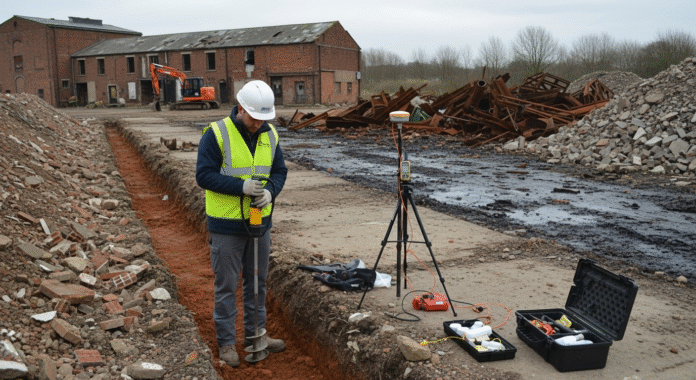When it comes to development, one of the most significant hurdles any project faces is securing planning approval. Local authorities require assurance that projects will not only meet building regulations but also protect the environment and surrounding communities. This is where environmental surveys by Adeptus play a vital role, bridging the gap between ambition and approval.
The Importance of Environmental Considerations in Planning
Every new development, whether it is residential, commercial, or industrial, has an impact on the environment. Local planning bodies are tasked with ensuring that developments enhance communities without harming natural habitats, polluting watercourses, or increasing flood risks. Without this level of scrutiny, developments could cause irreversible damage.
Environmental surveys by Adeptus provide the evidence needed to demonstrate that projects respect these responsibilities. They not only address regulatory requirements but also offer developers peace of mind, knowing their plans are backed by robust environmental science.
Expertise That Builds Confidence
Planning approval often comes down to how well prepared a developer is in responding to environmental questions. Authorities want to see data-driven reports and expert recommendations. This is why engaging specialists is essential.
With years of experience, environmental surveys by Adeptus combine technical knowledge with practical solutions. Their team knows how to anticipate concerns from regulators and design surveys that directly address those issues. Whether it’s assessing contamination risks, biodiversity impact, or air quality, their expertise adds credibility to applications.
A Partner in the Development Journey
For developers, planning is rarely a straightforward process. There are challenges at every stage, from initial concept designs to community consultations. Having a partner who understands the complexities of environmental regulations can make a significant difference.
Environmental surveys by Adeptus act as more than just reports. They are part of a collaborative process, guiding clients through technical requirements and helping them adapt plans to secure approval faster. This human touch is what makes the difference between a delayed project and one that moves forward smoothly.
Mitigating Risks Early
One of the biggest setbacks for development projects comes from unexpected environmental findings late in the process. Discovering soil contamination after plans have been submitted or learning that a site affects protected wildlife can be costly and time-consuming.
Through environmental surveys by Adeptus, developers gain early insight into potential risks. Identifying these issues upfront allows for mitigation strategies to be designed and integrated into proposals before submission. This proactive approach saves time, reduces costs, and avoids unnecessary disputes with planning authorities.
Supporting Sustainable Development
In today’s world, sustainability is not just a buzzword—it is a necessity. Communities expect developments to align with environmental goals, such as reducing carbon footprints, protecting green spaces, and enhancing biodiversity.
Environmental surveys by Adeptus help developers demonstrate their commitment to sustainable practices. By incorporating ecological assessments, air quality monitoring, and water management strategies, they ensure projects not only meet legal standards but also exceed community expectations. This sustainable angle often strengthens the case for approval.
Communication That Bridges Technical and Practical Worlds
Environmental data can be highly technical, filled with scientific terms and complex analysis. While regulators understand this language, developers and community stakeholders may not. Clear communication becomes crucial in translating findings into practical actions.
Environmental surveys by Adeptus are known for presenting complex information in accessible ways. Their reports are designed to be understandable and actionable, ensuring everyone involved—from architects to community members—feels informed and reassured. This clarity often helps avoid misunderstandings and builds trust in the development process.
Real-World Impact on Approvals
The ultimate measure of success is planning approval, and many developers have seen their projects progress thanks to environmental surveys by Adeptus. By addressing environmental concerns with precision and care, they provide local authorities with the confidence to grant permission.
Beyond approval, their work also ensures that developments are safer, more resilient, and more beneficial to communities. From redeveloping brownfield sites to supporting new housing projects, their contribution shapes places where people can thrive.
A Human-Centred Approach
What sets environmental surveys by Adeptus apart is the human-centred approach. They recognize that behind every development there are not only regulations but also communities, investors, and future residents. By balancing environmental protection with the practical needs of development, they help create outcomes that benefit everyone.
Developers feel supported, local authorities feel reassured, and communities feel heard. This balance is what makes their role so critical in the planning landscape.
Looking Ahead
As environmental regulations continue to tighten and sustainability becomes even more central to planning policy, the value of expert guidance will only increase. Environmental surveys by Adeptus will remain a crucial element of successful planning approval, helping developers adapt to new expectations and deliver projects that stand the test of time.
Their blend of scientific rigor, practical advice, and human understanding ensures that the path from planning to approval is not just possible but efficient and effective.
Conclusion
Securing planning approval is a complex journey, one that requires developers to balance ambition with responsibility. Environmental surveys by Adeptus make this balance achievable. By identifying risks, offering sustainable solutions, and communicating clearly, they provide the foundation for developments that succeed on every level.
Through their work, projects move forward with confidence, communities are protected, and the environment is respected. In today’s evolving planning landscape, their role is not only valuable—it is indispensable.



